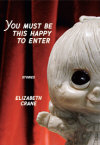You Must Be This Happy to Enter
In Elizabeth Crane’s You Must Be This Happy to Enter, her third collection of stories, she tempers a sometimes pessimistic worldview with an exuberant joy that suffuses her stories from start to finish. From the bouncing opening story “My Life is Awesome! And Great!” (which may contain more exclamation points than every other short story collection published this year combined) to the warm familial ending of “Promise,” Crane takes her quirky style and uses it to bring a variety of mostly female protagonists to life, including a woman who gets turned into a zombie at a JoAnn Fabrics store and ends up as a contestant on reality television, a girl obsessed with staying inside her boyfriend’s closet, and a teenager whose forehead is covered in ever-changing multi-colored words who meets a boy whose face displays polaroids.
In Elizabeth Crane’s You Must Be This Happy to Enter, her third collection of stories, she tempers a sometimes pessimistic worldview with an exuberant joy that suffuses her stories from start to finish. From the bouncing opening story “My Life is Awesome! And Great!” (which may contain more exclamation points than every other short story collection published this year combined) to the warm familial ending of “Promise,” Crane takes her quirky style and uses it to bring a variety of mostly female protagonists to life, including a woman who gets turned into a zombie at a JoAnn Fabrics store and ends up as a contestant on reality television, a girl obsessed with staying inside her boyfriend’s closet, and a teenager whose forehead is covered in ever-changing multi-colored words who meets a boy whose face displays polaroids.
In “Emmanuel,” Crane combines the surreal quirkiness of her prose with what a strong dose of pop culture to tell the story of a mother who wakes up one morning to find her baby reborn as an adult Ethan Hawke, taking in stride her new child’s explanation that she should have known “that children in Los Angeles grow up quickly.” As the narrator and her husband adjust to life with their now-famous son (who still has the motor skills and temperament of a baby), they attempt to raise him as they would any other child while also dealing with the unexpected consequences of his fame. In this way, Crane creates a story that disguises its deft exploration of the act of parenting behind a smokescreen of weirdness. As the narrator explains to a weepy Ethan Hawke about both the nature of heaven and the meaning of life, she says:
We had to explain that we were here in our earthly lives for a reason, and of course he wanted to know what that reason was, and we said to do the will of god, and he said how do you know what this is, and we said we pray and listen for answers, and he said how do you know it’s god talking and we said that we always tried to be mindful of anything that might be the word of god, since we know that he doesn’t just come walking up and ringing your doorbell but that on any given day there could be dozens of moments that maybe seemed like they were only coincidental… but how many people take the time to really consider that on a deeper level?
In this way, Crane is able to write about topics that would come off as schlocky or clichéd in the hands of a less capable writer.
In the title story, Crane continues to buck the trend of dour literary protagonists with a photographer who always focuses on the best parts of life. Visiting a gruesome art exhibition at the beginning of the story, she reacts by saying, “I don’t care if you think the only thing worth depicting in your art is a soulless, violent, war-torn world,” a philosophy that is tested by the rest of the story’s events. The narrator starts her own gallery, hanging photos of people being happy, including a series of pictures entitled “Happy Dude, Happy Dude Wearing Shorts, Happy Dude Wearing Shades, Happy Chick, and Happy Chick with Rainbow [Thinking about Unicorns].” When she’s arrested and jailed for being happy (which her cellmate explains is “no longer legal in three states”), she still manages to make the best of it, ending the story with a smile on her face and a hopeful future ahead of her.
In many ways, this is what Crane promises over and over in these stories: Not eternal happiness, not an escape from pain and misery and sadness, but instead a reminder that there is always something to smile about, that there is always a parent or a friend or stranger waiting to help relieve you of the worst of your burdens. Her characters are challenged by both the surreal situations of their lives and the very realistic tragedies that befall them, but most rise above with a combination of faith and optimism. In the same way, you may start You Must Be This Happy to Enter in any variety of moods, but Crane’s wit and sincerity guarantees that you will leave more joyful than you came in, as worthy an effect as any book can hope to have had on its reader.





